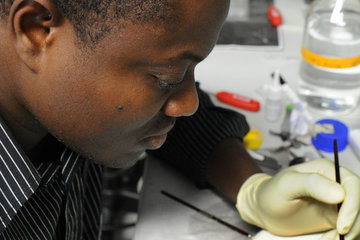
Cooperation with India
Setting up cooperation with India – an overview
The Max Planck Society is extremely popular among India's early career researchers. Every 12th doctoral researcher at Max Planck Institutes in 2022 came from India, which represents an increase of over 21 per cent over the past five years. This makes Indian doctoral researchers the second largest foreign group at Max Planck Institutes and the largest at the International Max Planck Research Schools (IMPRS).

What this rapid and growing increase suggests is that the Max Planck Society’s international exchange and networking programmes for early career researchers have been a great success, especially in India. The partner group programme offers another succinct example of this: there are more active partner groups in India than anywhere else in the world, where 78 of them have been founded since 2004, of which 27 were still active as of May 2023. The high number of Indian PhD students and post-doctoral researchers at the various MPIs is one of the factors that explains the success of the partner group programme in India, whose ranks include successful early career researchers. Following their return to India, they can access the partner group funds to support PhD students and post-doctoral researchers in their own research groups.
Collaboration in Max Planck Centres
Close collaborations are common in the life sciences, one example of which is a top-level joint research project between the Indo-German Indo-German Max Planck-NCBS Center for Research on Lipids and the National Centre of Biological Sciences (NCBS) in Bangalore under the leadership of the Max Planck Institute of Molecular Cell Biology and Genetics in Dresden, in which the Max Planck Institute for Infection Biology in Berlin, the Max Planck Institute of Colloids and Interfaces in Potsdam, and the Institute of Life Sciences in Bhubeneswar were also involved. This Center which officially ended in December 2022 was collaborating to analyse the complete inventory of lipids in cells and organisms on the basis of which they want to develop instruments that will enable them to use the individual components of fat for biological system analysis purposes, which will make it easier to study and treat disease. [more]
Indo-German collaboration on the computer sciences also takes places at the centre level. The Indo Max Planck Collaboration in Computer Science (IMPECS) has been operated at the Indian Institute of Technology (IIT) Delhi by the Max Planck Institutes for Computer Science and Software Systems in Saarbrücken and Kaiserlautern since 2016.
Research in Germany - with the Max Planck India Mobility Grant
Qualified and promising Indian post-doctoral scientists with an established research profile who are in their final year of doctorate or have received their doctorate no more than ten years ago are eligible to be nominated for Max Planck-India Mobility Grants all year round.
Grant recipients are required to spend at least one month a year at a Max Planck Institute. The host institute receives 5000 euros per year for a total of three years for each of the Indian post-doctoral researchers, which can be used to cover airfares, subsistence costs, and local travel expenses.












